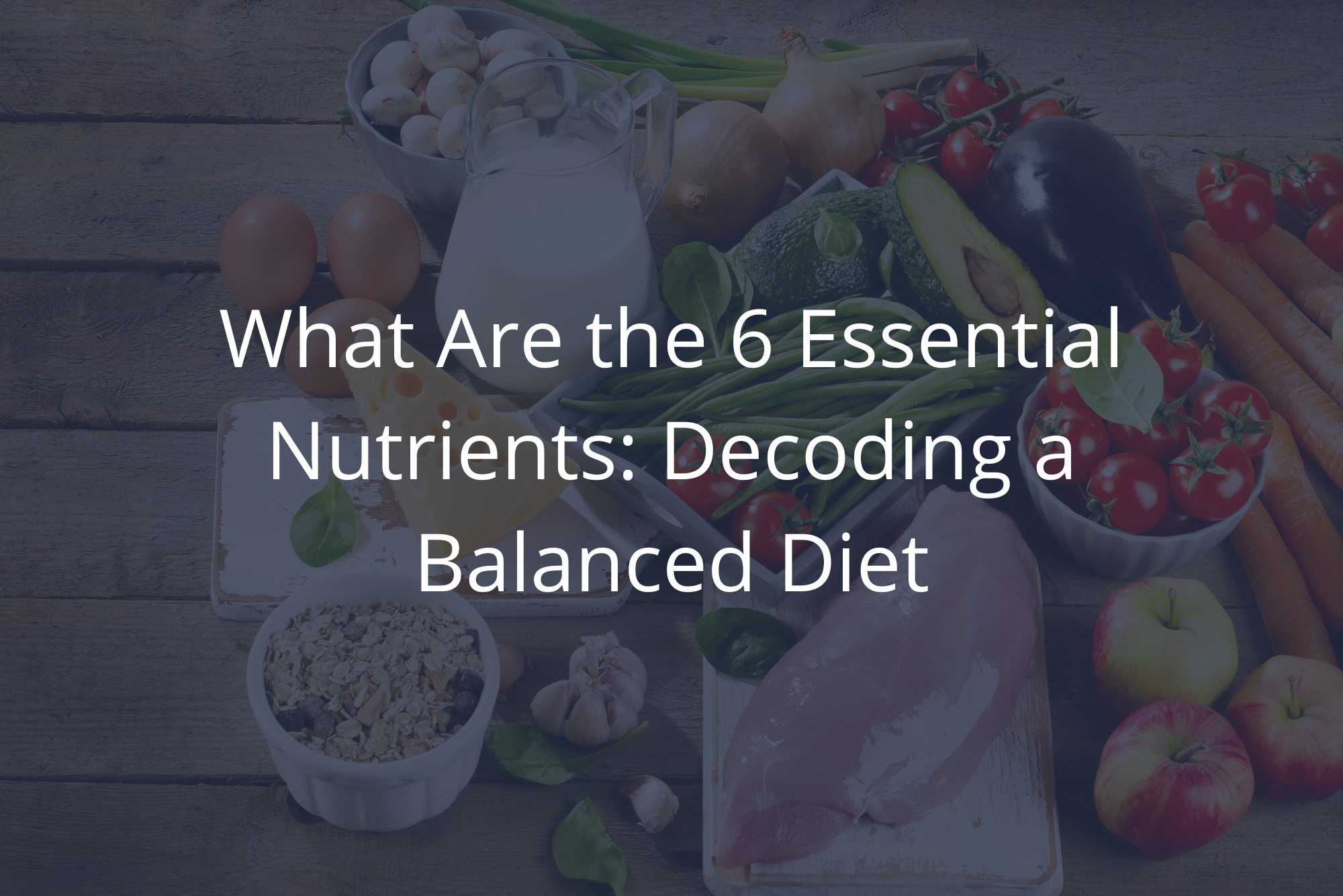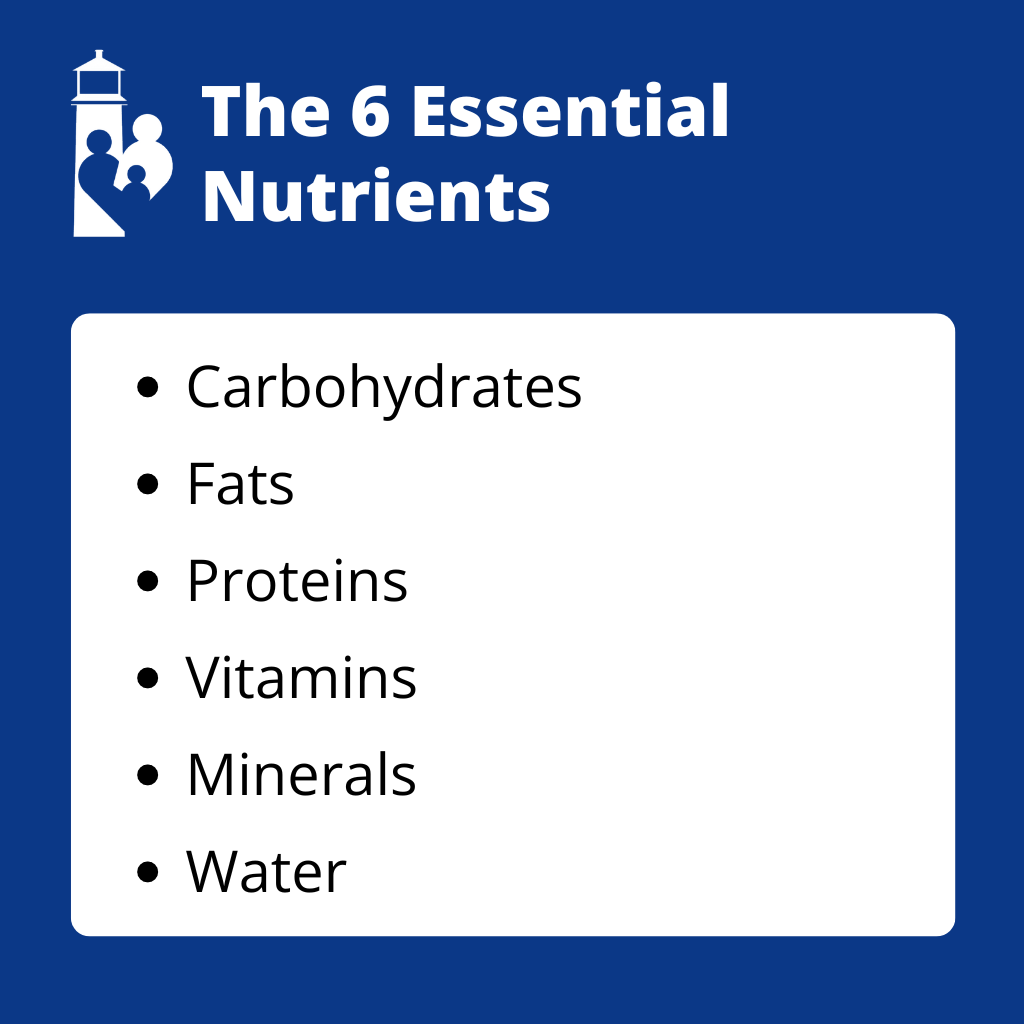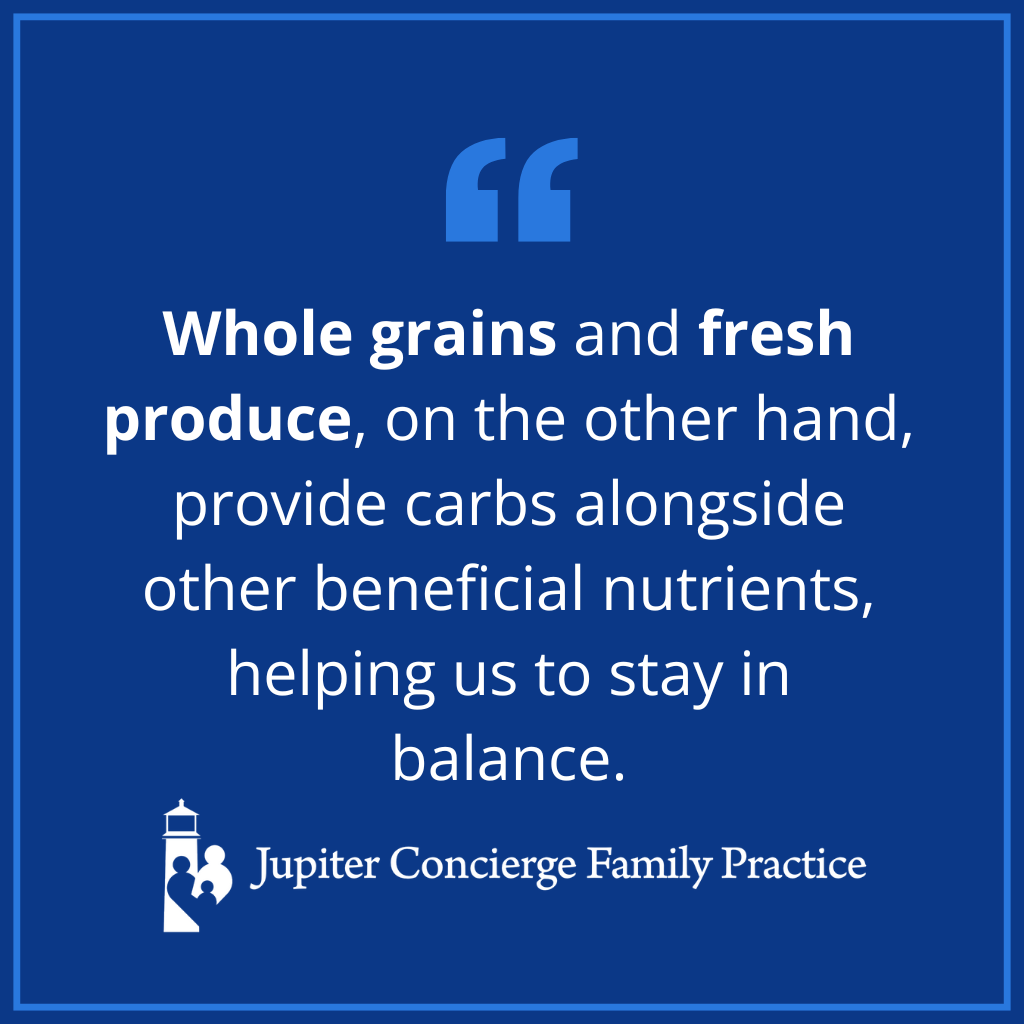
We’ve all heard about the importance of a “balanced diet,” but what does that actually look like on your plate?
With so much dietary advice floating around this digital ocean, it’s no surprise that many people who want to eat well aren’t quite sure how to go about it. To offer some direction, in this post I’m breaking down the six essential nutrients our bodies need and why they’re so crucial for our health.
What Are the 6 Essential Nutrients?
Let’s start with the basics — the building blocks of nutrition. Thankfully, we only have six nutrient classifications to contend with:
- Carbohydrates
- Fats
- Proteins
- Vitamins
- Minerals
- Water
Each of the six essential nutrients plays a vital role in keeping our bodies functioning, and functioning optimally. Below, I’ll briefly outline some of the most important functions of these six essential nutrients, address certain prevailing myths, and touch on healthy sources you can incorporate into your routine.
Carbohydrates: Not the Enemy
Carbohydrates often get a bad rap, but they’re actually an essential source of energy for our bodies. Ever notice how athletes “carb load” before a big event? They’re stocking their bodies with the readily available energy carbohydrates provide.
Carbohydrates also bring structure to our cells, both to membranes and internal components. Without carbohydrates, we’d lose the microscopic “skeleton” that keeps us functioning at a cellular level.
Why, then, do we so often hear carbs painted as the enemy?
Fruits, vegetables, breads, grains — all offer potentially healthy sources of carbohydrates. The problem is that carbohydrates also make up the most common sources of the copious processed snacks and meals you find up and down supermarket aisles.
These convenient, enticing processed foods are often high in carbs and, by virtue of their processing, low in other nutrients. Consequently, it’s easy to fill our days with far too many carbs for a balanced diet.
Whole grains and fresh produce, on the other hand, provide carbs alongside other beneficial nutrients, helping us to stay in balance.
Fats: The Misunderstood Nutrient
In other circles, fats have been singled out as the villain of modern diet culture. But here’s the truth: Fats aren’t inherently bad. In fact, “good” fats are essential for our health.
Fats provide stored energy, which is different from the quick energy we get from carbs. They’re also crucial for cellular communication and hormone production, especially estrogen and testosterone.
Perhaps the most demonized fat — cholesterol — is actually a vital nutrient in creating hormones and regulating cellular function. It’s only when we have too much cholesterol or cholesterol oxidation that we run into problems like heart disease.
Good sources of healthy fats include avocados, nuts, grass-fed beef, and pasture-raised eggs. The key is to focus on natural, unprocessed sources of fat. And if they come from an animal, remember: the healthier the animal, the healthier the food.
Proteins: The Body’s Building Blocks
With the third nutrient, we finally have agreement across most platforms: Protein is an important and healthful nutrient.
Proteins supply the building blocks and maintenance crew for our body’s crucial support system, like muscles and tendons. They also come to the rescue of damaged cells and help with effective hormone function. Without protein, we no longer produce the enzymes responsible for facilitating all the crucial chemical reactions in our bodies.
Clearly, protein is vital. Healthy sources include lean meats, fish, eggs, legumes, and dairy products, with the same consideration I mentioned for fats: If the animal source is healthy, then the food will be healthier too.
For my vegetarian and vegan patients, I always stress the importance of combining different plant proteins to ensure you’re getting all the essential amino acids your body needs.
Vitamins: The Colorful Defenders
I probably don’t need to convince you that vitamins are a healthy part of a balanced diet, but let’s talk about what they do, where they’re found, and how you can get the widest variety.
Vitamins comprise that alphabet soup you see listed on nutrition labels and supplements: vitamin A, B1, B2, B3, C, etc. While we only need vitamins in small quantities, they play a huge role in keeping us healthy. Among other functions, they support our immune system, help lower our risk of disease, keep our blood and brain healthy, and allow our nerves to signal properly.
As you might guess, we get most of our vitamins from fruits and vegetables. A fascinating twist you might not have heard is that all those lovely, varied colors you see in fruits and vegetables actually are the different vitamins! So, the more colorful your plate, the more vitamins you’re consuming.
Minerals: The Tiny Titans
Like vitamins, we only need minerals in small quantities, but they’re absolutely crucial for our health. You’re probably familiar with the need for minerals like magnesium, iron, and zinc, but you might be surprised to discover our need for others — like copper and cobalt.
Minerals aid our bodies with many crucial chemical reactions, facilitating everything from brain health to proper metabolism. People sometimes add electrolytes to their water because those minerals help with hydration.
A Note on Vitamins and Minerals
If you’re eating 6–10 fruits and vegetables of varied colors every day, you’re likely getting all the vitamins and minerals you need from your diet alone. Unfortunately, very few of us eat that quantity.
While you may not have a true deficiency — a severe lack that leads to disease — true health isn’t just the absence of disease. For those of us who struggle to consume enough plants on our plates, quality supplements may be helpful to augment health. However, I always advise that people get as many of their nutrients as possible from their food.
Water: The Unsung Hero
Speaking of hydration, let’s move on to the most important nutrient of all: water. Why do I call it the most important? Because you can survive for weeks without food, but you’ll only last a few days without water.
We need water in large amounts so it can serve its many critical jobs in our bodies. It regulates our temperature, blood pressure, and blood volume; it lubricates and cushions our joints; and it flushes waste from our system. Water is also the medium that shuttles other nutrients wherever they need to go in our body.
Unfortunately, many of us don’t drink enough water, maybe because we get busy and forget or we don’t want to make frequent trips to the bathroom. But with all the roles water plays in your body, staying hydrated is worth the extra effort!
Creating Your Balanced Plate
Now we have a clear picture of the six essential nutrients we need in our diet. On one hand, this knowledge makes creating a balanced plate simple: Find foods you like, vary them according to these nutrients, and you’ll have a much better chance of being healthy.
On the other hand, if it’s so simple, why isn’t everyone doing it?
We’ve all experienced obstacles to eating a healthy, balanced diet. I’ll highlight two of the most common difficulties I see — because sometimes just recognizing them is enough to overcome them.
The Carb Conundrum
Yes, I realize I just said how important carbohydrates are as an essential nutrient. And it’s true. But eating too many carbs, especially in the form of processed foods, is a recipe for disease processes.
When you eat too many carbs, you often don’t get enough of the other essential nutrients in your diet. Instead of reaching for processed carbs — which have been stripped of their natural vitamins and minerals — aim to include a variety of whole foods at each meal.
The Lunch Struggle
Meal planning isn’t easy for everyone, and I’ve found lunch to be particularly tricky.
Here’s a tip I’ve personally found helpful: When you make a nutritious dinner, make extra and pack it for lunch the next day. This not only saves time but also reduces the number of meal-related decisions you have to make. It also ensures you get a nutritious meal at a time when it’s often hard to eat well.
Beyond the 6 Essential Nutrients: Maximizing Absorption
Eating the right foods is only part of the equation. How we eat is also important for proper nutrient absorption. Here are a few tips to maximize the benefits of the six essential nutrients in your diet:
- Avoid overeating.
- Stay hydrated — a prerequisite for proper digestion.
- Eat in a relaxed state, without stressors or distractions. Our body absorbs nutrients best when we’re in “rest and digest” mode, not “fight or flight.”
- Consider the quality of your food storage. I recommend using glass containers instead of plastic to avoid chemicals and microplastics leaching into your food.
Eat in Balance With the 6 Essential Nutrients
By focusing on these six essential nutrients and creating an environment that supports good digestion, you set yourself up for eating a healthy, balanced diet. Not only that, but many of the practices that promote good digestion — like taking a break from work or having an enjoyable meal with a friend — also promote resilient mental health.
With our busy lives, taking the time to plan meals with real, whole foods and in relaxed environments may seem daunting — but it’s worth it. Your body, your mind, and even your family and community all reap the benefits!

Dr. David Rosenberg
Dr. Rosenberg is a board-certified Family Physician. He received his medical degree from the University of Miami in 1988 and completed his residency in Family Medicine at The Washington Hospital in Washington, Pennsylvania in 1991. After practicing Emergency Medicine at Palm Beach Gardens Medical Center for two years, he started private practice in Jupiter, in 1993. He is an avid baseball fan and Beatles fanatic, since he was 8 years old. He has been married to his wife, Mary, since 1985 and has three grown children.
David completed additional studies at Mercer University, Macon, Georgia and obtained a BS in Chemistry in 1983.
“My interests include tennis, snow skiing, Pilates and self-development.”


